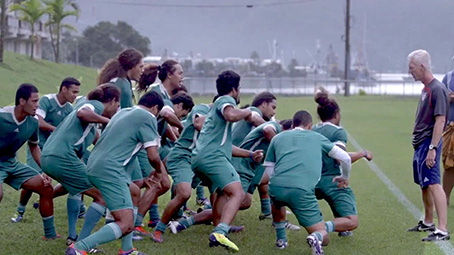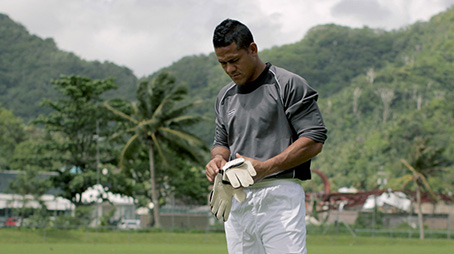'Yeah, I think this was just one of those projects that
needed two people to look each other in the eye and say:
"this is clearly an idea so daft that we have to do it."' |
Co-director Mike Brett |
I have twenty different ways to attack this review but be assured that none of them is anything to do with soccer. Before going out to see this hugely charming and effortlessly inspiring slice of independent cinema, rid yourself of any notions of requiring football knowledge to appreciate it. That's like putting forward the rather odd idea that to appreciate a cake, you have to be intimate with the essence of flour, eggs, butter and sugar. Taste that cake. It's delicious. Not only has the sum of the parts of this project woven a truly magical spell, the parts on offer also throw up so many aspects of the human condition that, in an indifferent world, need promoting. Few movies can claim to show us the best of human nature. Next Goal Wins does that by default. I will say, hand on heart, that despite my militant atheism, the culture and society of American Samoa are things to be admired and emulated. God I can put to one side but all other aspects of this rich and enchantingly human culture seem to promote fairness, inclusivity and belonging. In short, these people, despite their poverty and lack of opportunity on their small island, actually excel at living. I know a lot of people who could take their spirit and carpe diem natures as direct and required lessons in humility, myself included.
Next Goal Wins is a feature documentary about what used to be the worst international football team in the world. Even though the 'what used to be' might be taken as a spoiler, it's really not. This is an underdog movie and underdog movies usually end well. This is not a film about losers but you could be forgiven thinking otherwise after the first scene. Beaten in 2001 by Australia (not known for its own soccer brilliance) by 31 goals to nil, American Samoa reluctantly entered the history books. AS's keeper developed a ball shaped goalpost traumatic stress syndrome from the experience. Having nowhere to go but up, the island authorities set out to improve their chances on the world stage. First, there came the motivational speaker who, from artfully timed reaction shots of the disbelieving team, was about as useful as a towel underwater. Next came the half-Samoan manager whose efforts were sincere but ineffectual. Help was channeled from on high as the local minister exhorts God him/herself to lift the team to, if not greatness, then to not losing so badly. But in the South Pacific Games, the national side managed to score no goals and concede twenty-six in a handful of matches. Here is where enthusiasm and inability collide. How does anyone take a palpably awful soccer team and elevate them to the dizzying heights of basic mediocrity? That's a tall order. At this point, the movie was starting to make a promise to deliver something quite extraordinary. With an hour to go and seemingly confident I knew how this whole scenario was going to play out, not only was I surprised time and time again, I also got so caught up with the fortunes of the players, I managed to pick up and reinforce a few important life lessons along the way.

Have you ever scored a goal? It doesn't have to have been at Wembley. It's a unique emotional rush. Usually I would trot out a comparative metaphor here but I used the word unique because it really is. I was a keen and reasonably decent player in my youth and still was playing in my 40s until an elbow in the chest impacted at full sprint convinced me that tennis was a better choice for an ageing frame. I love live football matches (on TV, let's not go mad) and a love of cinema is its twin. Matches are ninety minutes long (the length of an average movie) and unlike movies, matches are guaranteed to be unpredictable. All the best action could happen in the first five minutes. A movie works up to its climax. A football match has no three-act structure. It is a ninety-minute tease, every forward ball a promise of things that may come to pass. And when you score, a number of very sensitive nerves are activated flooding you with endorphins for a brief rush. You also get the reward for having done something good for others. For the goal scorer, it's the goodwill from team mates and back room staff. So Next Goal Wins has a backdrop of a sport that is easy to understand and generates very obvious highs and lows. And it's so refreshing to see football matches covered in a different style than the master overseeing eye and the touchline close ups.
FIFA (the global football governing body) advertise for a manager for the ailing American Samoa side. They get one applicant, Thomas Rongen, a Dutch football coach who moved to the States in the late 70s. Soccer superstars George Best and Johann Cruyff are mentioned but this is a little misleading as the filmmakers are clearly trying to big the Dutchman up. It's while playing for the L.A. Aztecs, he barged shoulders with these icons of 70s football, a long way from their peak time at the plate. It's clear from moment one that Rongen is bringing his culture with him and the baggage weighs heavily for a short time. Allow me a short digression. In Chris Turner's superb 'Planet Simpson', a book examining the cultural impact of the glass teat's longest running, English-speaking cartoon show, (Japan's Sazae-san gets the longest running of all award), he mentions a culture clash that I have always recalled in times of foreign etiquette panic. Turner was on a bus heading for Seville and got into a conversation with fellow American travellers. One was a student who was driven crazy by his Portuguese roommates not wanting to adopt the best problem-solving policy – airing grievances... Here are some selected quotes to give you a flavour of the argument...
Why, he wondered, did his Portuguese roommates refuse to adopt what was so obviously a superior way of addressing frictions and grievances? His intentions were wholly admirable, his approach democratic and honest, his goal quite possibly beneficial to all involved. And there was no way to explain to him that his frustration was a result of his faults, not theirs. It hadn't occurred to him that his Portuguese roommates might have their own problem-solving methods, that they might have their own values... and that they might hold these values just as deeply as he maintained his own preference for open dialogue and efficient resolution. Worst of all, it didn't seem to occur to him that he was a guest in a foreign country, that the Portuguese approach, even if flawed, inherently carried more weight than his own in the dormitory of a Portuguese university.
Few Americans seem capable of understanding that their conversations with the world are mostly one-sided, that America usually chooses the rules of the game and the parameters of the debate. And that people the world over tend to resist a solution — even the right one — when it is forced upon them.

I bring this up because Rongen carries his very American 'can-do' attitude with him. In forcing those absolute values on to a team that despite their country's nomenclature are very far away from America, he is alienated from the get-go. Let's not forget that cultural stereotypes play their part here. Rongen is Dutch and having had some experience in that part of the world (one of my best friends is Dutch) I can sympathise with the befuddled team faced with western determination, merciless logic and an amalgam of every Dutch/American cultural cliché. I'm sure this is what we are supposed to think because about halfway in we realise that something magical is happening. Brought in to impose his winning will on a team of amateur enthusiasts, Thomas Rongen suddenly starts to allow the islander's lifestyle and attitudes to impact his own soul. Baring his grief at the death of his daughter in a car crash cements the bond and suddenly this movie grabs you by the heart and doesn't let up.
Slowly, as the unifying process begins to take shape, the movie allows us to see the individuals, the most famous of all of course is the world's first transgender football player, Jaiyah. As an ambassador for alternative gender choices, she's just simply wonderful. She has an untainted passion for a sport that has become a billionaires' chess game in the west. She serves almost as a mascot for the team ("Jaiyah keeps us up!" says one admiring team member) and I keep thinking how far we still have to go in cultural acceptance. Can you imagine for one second a transgender football player in the UK? Paul Dacre (editor of The Daily Hate Mail) would have thought all his Christmases had come at once. She was not expected to make the first team but bless Rongen for seeing a fierce determination in her performance. Yes, the movie is edited (very, very cleverly) to highlight certain skills and incidents, but this touching documentary makes you think it's honest honing and not the iffy work of some charlatan behind the curtain pulling the bootlaces. Then there's Nicky, the hapless goalkeeper, who was tempted back to the side (Rongen feels that he's owed a happy moment on the pitch given the fact that he still has nightmares of that 31-0 drubbing). In the film's funniest moment, one of the players says of Nicky that he re-enacts the game on his X-Box and that "...he keeps losing but he's trying!" Just lovely.
To say any more would be to ruin a fair collection of emotional surprises that lay in store. The directors (Mike Brett and Steve Jamison) have done a marvellous job of assembling the patchwork quilt of odd shots and remarks, snatched pieces of dialogue and football action and rolled them all into one glorious confection that is both touching and enormously human. It reminded me of what it felt like to score a goal – for ninety minutes. Next Goal Wins won me over completely.
Next Goal Wins goes on UK release at selected cinemas on 9th May 2014, with nationwide previews on 7th May 2014.
|